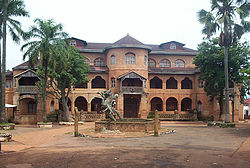
Quick Facts

Biography
King Ibrahim Mbouombouo Njoya (1860–1933) was 17th in a long dynasty of kings that ruled over Bamum and its people in western Cameroon dating back to the 14th century. He succeeded his father Nsangu, and ruled from 1886 or 1887 until his death in 1933, when he was succeeded by his son, Seidou Njimoluh Njoya. He ruled from the ancient walled city of Fumban.
Person and life
Colonel Gorges of the British Army, who met him in 1914, described him thus: "A fine upstanding man, not very negro in type, dressed in blue robes and wearing a turban with the end tied under his chin and over his mouth." He practised polygamy — Gorges reported that he had 600 wives and 149 children by 1915; it is thought that he had 177 children in all.
Rule
Njoya's mother, Njapdunke, acted as regent until he reached majority. His official rule was further delayed because his father's head was held by an old adversary, the Nso people. (By tradition the head or skull of an ancestor is of ceremonial importance to the Bamum.) The Germans helped him in recovering the head and this, along with their allowing him relative independence, caused him to have generally good relations with them. An additional factor seems to have been a belief that fighting the Germans would prove counterproductive to his people, hence he rejected the resistance proposals of Rudolf Duala Manga Bell.
Col. Gorges noted in 1914 that he held court or durbar daily outside the gatehouse for the dispensing of justice and receipt of tribute, and that all his people had access to him. There was a very well-defined code of court etiquette observed.
"Any courtier wishing to speak to him assumes a cringing attitude, removes his skull-cap, clasps his hands and, taking a chukker round behind the presence, finally arrives at the royal elbow. Here he averts his head and makes his request in a hoarse whisper. When the king coughs or clears his throat everyone present softly claps his hands."
Innovations
Ibrahim Njoya is credited with developing the Bamum script, a syllabic system for writing in the Bamum language. Before his reign, the long history of the Bamum people was preserved primarily through oral transmission from one generation to the next in the manner of the African Griot tradition. (This was largely true of many other African civilizations of the time.)

Recognizing the inherent danger of important historical facts being omitted or corrupted, he set out to establish a means of written recording of Bamum history. When his work was completed, his alphabet, called, A-ka-u-ku, contained 73 signs.
Njoya is credited with inventing a hand-powered mill for grinding corn.
His grandson, Ibrahim Mbombo Njoya, a present-day Sultan in Cameroon and the latest ruler in the Bamoun Dynasty, has established a school in the palace built by his grandfather, in which schoolchildren are learning the Bamum script developed by Ibrahim Njoya.
